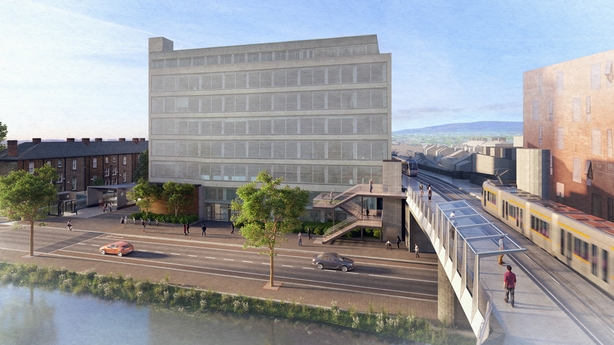Chief Executive of Transport Infrastructure Ireland (TII) Peter Walsh has said the MetroLink rail project will "revolutionise" public transportation if approval is granted by An Bord Pleanála.
He made the comments on the final day of oral hearings into the Dublin rail project which concluded after six weeks.
"With trains running every three minutes during peak periods and the capacity to carry up to 20,000 passengers per hour in each direction, MetroLink offers a comprehensive solution to the increasing transportation demands of Ireland’s growing population," Mr Walsh said.
TII told planning inspectors that the system is badly needed as Dublin grapples with congestion and "inefficient" transport systems.
It is ranked as the 35th most congested city globally, according to TII and this in turn creates big economic and societal costs due to traffic delays.
"MetroLink's intervention along the Swords, Dublin Airport, Dublin city centre corridor is essential to alleviate congestion, reduce reliance on private cars, and enhance public transport connectivity," Mr Walsh said.
Inspectors were told that MetroLink will improve accessibility to jobs, education, and other social and economic opportunities through the provision of improved inter-modal connectivity and integration with other public transport services and connectivity for national and international passengers using Dublin Airport.
The 18.8km proposed rail line will become a pivotal element in the city's public transport evolution toward becoming a modern, liveable European Capital City, according to TII.
Over the past six weeks inspectors have heard more than 120 submissions from stakeholders including TDs, business owners, residents associations, GAA clubs and environmentalists voicing support both for and against the long-mooted underground metro system for the capital.
"Consultation is at the core of the railway order process and I would like to acknowledge and salute the commitment of each homeowner, business owner or interested party who participated in this invaluable consultation process," Mr Walsh said.
Residents criticise TII's 'late document dumps'
Throughout the proceedings, several residents' associations were critical of "late document dumps" by TII.
Some 200 last-minute documents and studies were presented by the body's experts, which residents said gave them no time to properly study and seek consultation on their contents.
TII made accessing information as difficult as possible said Anne Meehan, a Glasnevin resident, who is in favour of an overground rail line because it is a greener option that will save the taxpayers billions.
Ms Meehan has been highly critical, claiming that the State body has had "little or no interaction" with property owners like herself.
"Dublin will have its MetroLink or similar in the future for the common good but I ask that you please not forget those that have been sacrificed or shafted for a risk benefit.
"Many who will pay the price for making this possible," Ms Meehan added.
Declan Campbell, representing Hampstead Residents, said while broadly supportive of the concept of the MetroLink, its members had to "forcefully request" information from TII under the Freedom of Information Act.
The poor engagement and lack of genuine consultation by the body is shocking, he told inspectors.
Mr Campbell criticised TII’s "private agreements" with other institutions and stakeholders attached with a non-disclosure clause that undermine the integrity of what is supposed to be an "open, impartial and transparent" hearing.
"We suggest this covert activity is more suited to an authoritarian system and should have no role within a planning process of public-funded infrastructure in a democratic state," Mr Campbell said.
Earlier this week, An Bord Pleanála announced its intention to readvertise the consultation to facilitate revised documents and new information provided by TII as the hearings progressed.
Mr Walsh said the body welcomed the decision to "ensure all stakeholders are afforded sufficient time to consider any additional information and remains committed to transparency and continued engagement".

Fianna Fáil TD for Dublin Bay South Jim O’Callaghan returned to voice his approval for the project because "Dublin needs an underground rail link to the airport".
However, he said that An Bord Pleanála inspectors should approve the railway order subject to conditions.
Mr O’Callaghan said Charlemont in the south city centre is not suitable for the terminus because it limits the future development of the Metro along the Green Line only.
"I don’t see it proceeding towards the south west of the city," Mr O’Callaghan said.
TII argued that the project is essential in terms of meeting Ireland’s obligations in terms of climate action and delivering a decarbonised future.
"TII has set out how MetroLink represents more than just a transportation project. It embodies Ireland's vision for a sustainable, accessible, and thriving capital city.
"By addressing current challenges and anticipating future needs, MetroLink stands as a testament to Ireland's commitment to progress and innovation," Mr Walsh said in his closing remarks to inspectors.
An Bord Pleanála will consider all aspects raised during the hearings.
It will either decide to approve the railway order for MetroLink, refuse it, or approve it subject to conditions.
In terms of an outcome, Minister for the Environment Eamon Ryan previously stated that he was confident a decision would be reached by the end of the year.
That was prior to the start of the hearings.
With more public consultation required, including the possibility of further oral hearings, which will ultimately be decided by the board, it is not known if that will impact the timeline of the decision-making process.




